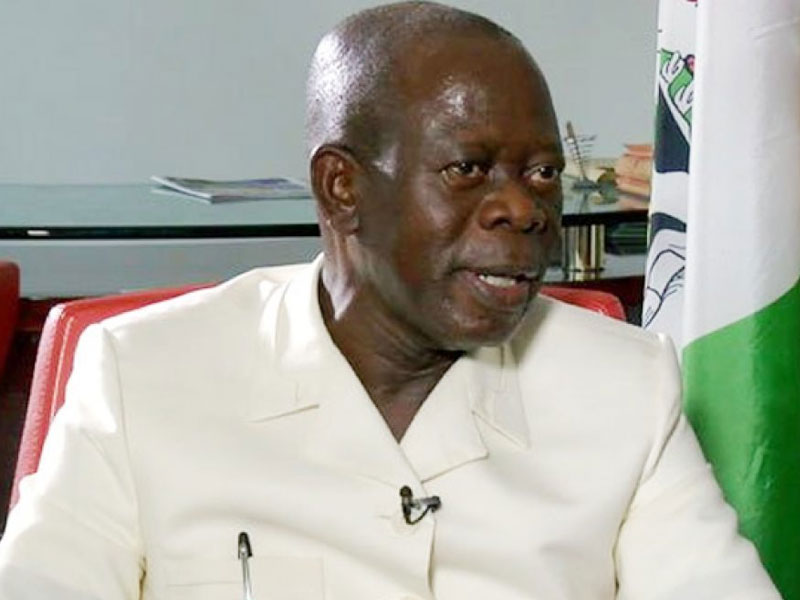The wrongful application of workers’ contributory pension funds by governors and the federal government is unacceptable, Senator Adams Oshiomhole (Edo North) said yesterday.
He knocked the federal and state governments for ignoring commercial bank loans and opting for the funds contributed by workers on their payrolls, owing to the very low interest rate.
The senator described the practice as a breach of the concept of the contributory pension scheme, which was established to represent a social capital which the workers would fall back on upon retirement.
Oshiomhole, a former National Chairman of the All Progressives Congress (APC), stated that the funds, currently estimated at over N11 trillion, ought to go into mortgage investments for workers, who upon retirement, are supposed to have a roof over their heads.
He lamented that the essence of establishing the pension fund have been eroded by the administrators.
Oshiomhole spoke in Abuja yesterday at the 8th Quadrennial National Delegates Conference of the Non-Academic Staff Union of Educational and Associated Institutions (NASU), with the theme: “Trade unionism in the era of economic crisis: Addressing the increasing poverty level of Nigerian workers.”
The erstwhile Labour leader said,
“I know I resisted the idea of contributory pension to be managed by Pension Fund Administrators PFAs. These PFAs are profit seekers, you cannot give me six per cent return on my pension savings and yet path with 25 per cent.
“In misery I am getting poorer but we are the greatest economists you can ever think of. Nowadays, that pension scheme is over N11 trillion deducted from your wages, if they put up a part of that trillion or more into mass housing, will workers remain homeless? No, because we were told that the reason we don’t have a flourishing mortgage system in Nigeria is that banks don’t give long-term funds.
“Governors go to borrow these pension funds at a very reduced interest rate for about six per cent, instead of going to the banks which have higher interest rates. Because the banks say they cannot give out customers’ funds to borrowers, especially because some save at maybe two to three months and come and collect, such funds cannot be used as long-term loans.”
The senator also condemned the brutalisation of the President of the Nigeria Labour Congress (NLC), Joe Ajaero by thugs, just as faulted the resultant two-day strike which grounded social and economic activities in the country.
According to him, oftentimes, Labour leaders go seeking implementation of their demands from governments, (the capitalists) with biased positions that are not well articulated, giving the government officials upper hand in their negotiations.
He said the Labour movement must always approach issues in a united front, even though the capitalists will always find ways to break or fragment them.
On the removal of petrol subsidy, Oshiomhole urged workers not to lament their sorry situation but to put on their thinking caps and wriggle out of the dire situation.
Rather than spend time agonising over unfavourable government policies, workers should engage as a united front to press home their demands to those in authority.
According to him, he successfully engaged former President Olusegun Obasanjo during his days as president of the NLC to make the prices of petroleum products remain at a reasonable level for Nigerians because he was always armed with specific demands from the affiliate unions.
President of NASU, Makolo Hassan, said state governments were the “biggest beneficiaries of the fuel subsidy removal which has plunged millions of Nigerians into abject poverty, as they continue to grapple with high cost of living.”
To this end, he asked state governments to replicate the federal government’s wage award to federal employees as an interim measure to cushion the hardship occasioned by the fuel subsidy removal.
Hassan said,
“In view of the fact that all state government workers are equally affected by the same hardship occasioned by the removal of fuel subsidy, we call on the remaining state governments to, as a matter of urgency, announce and implement their awards.
“State governments have no option than to do so because they are the biggest beneficiaries of fuel subsidy removal in view of the quantum of increase in the allocations they are now receiving from the Federation account.”
Hassan also called on President Bola Tinubu to kick start the processes of reviewing the current national minimum wage Act, as workers were “struggling to survive the harsh economy and an extremely high cost of living which was no longer commensurate with their take home pay.”
Admitting the economic crisis facing the country, the NASU President lamented that the monetary policies of the immediate past and current government has given rise to an inflation rate of 27.3 per cent, an exchange rate of as high as N1,100 to a dollar as at the time of report, and the high price of pump price of petrol currently at N640 per litre, and as such, was making mockery of the current minimum wage.
He said,
“The call for the review of the National Minimum Wage has become urgent in view of the information given by the National Bureau of Statistics (NBS) in its report for October 2023, which stated that the major contributors to the increase in inflation were food and non-alcoholic beverages, housing, water, electricity, gas and other fuel, clothing and footwear, transport, furnishings, household equipment and maintenance. The continued rise in inflation was attributed to removal of petrol subsidy and the devaluation of the official exchange rate
“I therefore call on the president to, as a matter of urgency, constitute a National Minimum Wage Negotiating Committee to review the current National Minimum Wage Act.”


